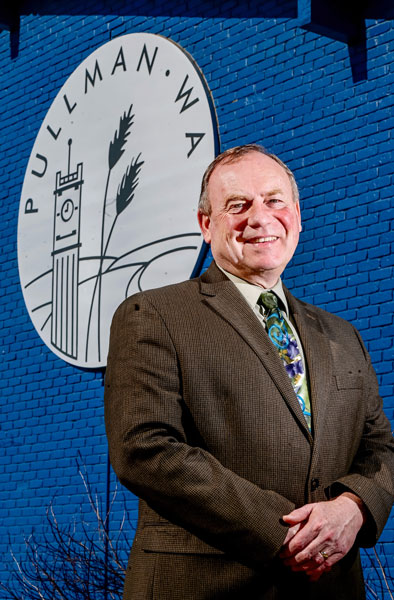The City of Pullman’s new mayor reflects on how losing an election made him better at governing.
By: Allyson Meyer

City of Pullman Mayor Francis Benjamin outside city hall. Credit: Liesbeth Flowers
Francis Benjamin’s key takeaway after narrowly winning one of the most competitive City of Pullman mayoral races in decades? Every elected official should lose an election.
Every elected official should lose an election.
“It was a good grounding to get me connected back into the community,” says Benjamin, who was elected Pullman’s mayor with 52.6 percent of the vote last November, eight years after losing a council seat he had held for three consecutive terms. “Even though I didn't like it in the midst of it, I grew so much because I went through that experience.”
After losing his reelection bid in 2015—which also required resigning from his post as immediate past president of the AWC Board—Benjamin, whose role as a local leader and elected official had been central to his identity for more than a decade, did some soul-searching. Instead of dwelling on his past, or on his present predicament, he decided to look to the future. And not his future, but the city’s.
“I started Pullman 2040, which is a visioning that asks, ‘What do we want Pullman to look like in 2040?’” says Benjamin, an academic who has worked in IT and supporting research in the psychology department at Washington State University since 1987. He currently oversees the Political Interaction Lab at WSU, studying concrete ways to improve the current political process and promote political civility.
Benjamin brought together a coalition of local leaders from nonprofits and businesses to develop a strategic long-range plan, identifying 50 key projects to be completed by 2040. It’s something he feels wouldn’t have happened if he’d won reelection since it “was truly a community grassroots effort,” separate from local government. With leadership in place and working together to jump-start key projects (like developing a downtown creative arts district and launching a downtown arts festival), Benjamin scaled back his involvement with Pullman 2040 to resume his role as a local elected, winning back a seat on the council in 2021.In January of 2024, he assumed the mantle of mayor when Glenn Johnson, a pillar in the community (and voice of the Cougs at WSU football games), retired from the position.
“Our community is at this point because of the people before me who have invested richly in [it] and left this incredible legacy,” says Benjamin. “I want to be able to continue that. I also know my leadership is for a narrow window in the timeline of our community. I want to make sure we have this continuation of a legacy that moves us forward.”
Lessons learned from this political rebirth?
“You don’t need to do this on your own,” Benjamin stresses, citing support he has received from local peers and connections he’s made across the state through organizations like AWC (where he serves on the Diversity, Equity, Inclusion, and Belonging Cabinet). He also cautions that newly electeds need to remember that winning an election is the easy part; holding on to an elected office is where the work begins./p>
“The mentality needs to be, ‘What can I do to serve?’” he says. “It is having this longer-range vision of how you are bettering your community, and the people in it.”
The mentality needs to be, ‘What can I do to serve?
Which sometimes means bettering yourself in the process.